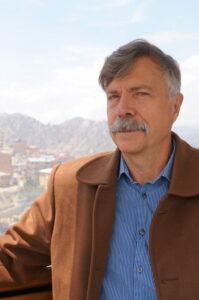NYAS Lecture 1/27: On the Infectious Affinities of Viruses, Plants, and Dying Human Bodies: Species’ Shifting Boundaries and Uncertain Futures
 The New York Academy of Sciences brings us another great installment of its lecture series on January 27th when Dr. Charles L. Briggs, Alan Dundes Distinguished Professor, Department of Anthropology
The New York Academy of Sciences brings us another great installment of its lecture series on January 27th when Dr. Charles L. Briggs, Alan Dundes Distinguished Professor, Department of Anthropology
University of California, Berkeley, presents, “On the Infectious Affinities of Viruses, Plants, and Dying Human Bodies: Species’ Shifting Boundaries and Uncertain Futures.” Dr. Jennifer Telesca, Assistant Professor of Environmental Justice, Pratt Institute, will act as discussant. The event will be held at 5:45 PM at the Roosevelt House, 47-49 E 65th St, New York, NY 10065.
Please note: the lecture begins at 6:30 PM, and while the event is free to attend pre-registration is required for entry into the building. Early registration is strongly recommended, since seating is limited. For the buffet supper, registration is also required.
This presentation charts the emergence of precarious futures by conjuring a space between medical anthropology, multispecies ethnography, linguistic anthropology, and zoonosis (exchanges of pathogens between humans and nonhumans). Its analytic task is akin to tossing a deck of cards into the air and trying to grasp how different beings would read their novel configuration. Here the entities unpredictably thrown together include humans, plants, bats, chickens, and viruses, and the forces that induce unforeseeable rearrangements include state efforts to turn environmental destruction into social justice, alternative indigenous socialisms that grant plants agency in imagining futures, and climate change. By tracing how assemblages of rabies viruses and human nerve cells occasion more-than-human speech acts and plants sensorily move between healers’ and patients’ bodies, it pushes against boundaries that would isolate species, ontologies, and subdisciplines.
About the Speaker:
Charles L. Briggs is the Alan Dundes Distinguished Professor in the Department of Anthropology, the Co-Director of the Medical Anthropology Program, Co-Director of the Berkeley Center for Social Medicine, and Chair of the Folklore Graduate Program at the University of California, Berkeley. His books include The Wood Carvers of Córdova, New Mexico; Learning How to Ask; Voices of Modernity (with Richard Bauman); Competence in Performance; Stories in the Time of Cholera (with Clara Mantini-Briggs); Making Health Public (with Daniel Hallin); and Tell Me Why My Children Died (with Clara Mantini-Briggs). He has received the James Mooney Award, the Chicago Folklore Prize, Edward Sapir Book Prize, the J. I. Staley Prize, the Américo Paredes Prize, the New Millennium Book Award, the Cultural Horizons Prize, the Robert B. Textor and Family Prize for Excellence in Anticipatory Anthropology, and fellowships from the John Simon Guggenheim Memorial Foundation, the National Endowment for the Humanities, the Lichtenberg-Kolleg, and the Center for Advanced Studies in the Behavioral Sciences.
All talks in this series take place at Roosevelt House, 47-49 E 65th St, New York, NY 10065. A dinner and wine reception will precede the talk: Buffet dinner at 5:45 PM. ($20 contribution for dinner guests/free for students). Lectures begin at 6:30 PM and are free and open to the public, but registration is required.